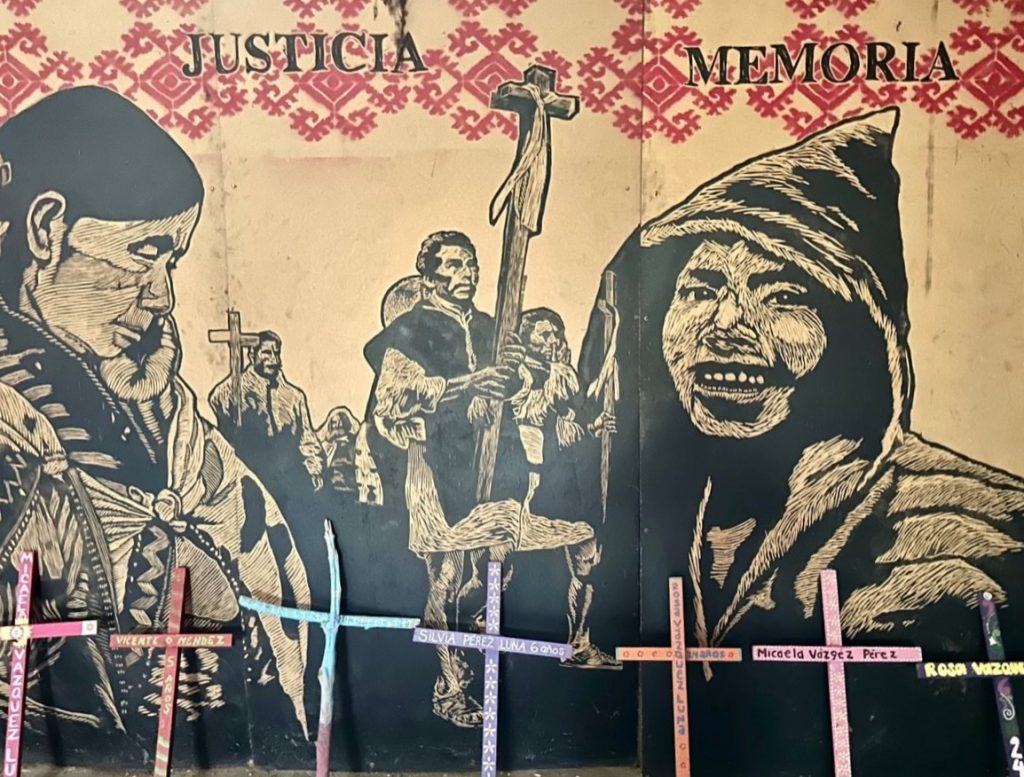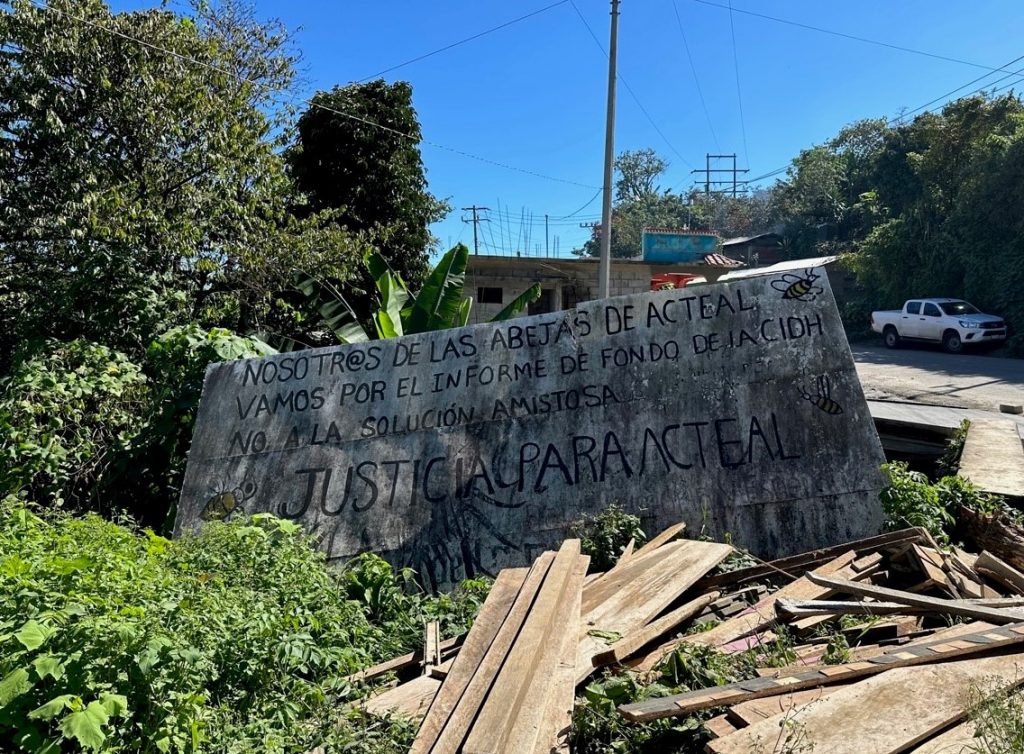Twenty-five years ago, on 22 December 1997, 45 people were brutally murdered in the small community of Acteal, municipality of Chenalhó, in the Chiapas Highlands of Mexico. Among the victims were children, women and unarmed men. They belonged to Las Abejas de Acteal (The Bees of Acteal), a pacifist civil society organization working for peace in the midst of conflict. Even today, relatives and survivors of the attack continue to demand truth, justice and reparations.
At the end of 1997, tension was at its peak in Chiapas. Although the Mexican government and the Zapatista Army of National Liberation (EZLN) had already signed the San Andrés Accords, violence had not ceased in the region, especially against Indigenous populations. Paramilitary groups, which many local observers associated with the Institutional Revolutionary Party (PRI), operated with the connivance of the authorities or even instigated by them, harassing people and communities suspected of sympathizing with the Zapatista movement. In the Chiapas Highlands, this harassment became an absolute policy of terror that caused the forced displacement of close to 9,000 people. The strong presence of the military and other armed actors, as well as the massive population movements, added tension to pre-existing conflicts and aggravated the already precarious living conditions of the Indigenous communities.
It is in this context that a group of Tzotzil Indigenous people sought refuge in the community of Acteal, fleeing from armed groups that had burned their houses and crops and stolen their belongings. While they were celebrating a prayer for peace in the community chapel, they were attacked by a group of about 90 paramilitaries with high-caliber weapons. Some people were able to hide and escape, but 16 girls, four boys, 18 women (five of them pregnant) and seven men were trapped and executed on the spot. Another 26 people, mostly minors, were wounded. Some still suffer from the consequences of their injuries today.

Only 200 meters from the scene of the attack, there was a post of mixed operations (military, judicial and public security) from which the attack was witnessed during the seven hours it lasted. They did not intervene in any way, neither to prevent the deaths nor to help the victims. In the following days, the government – and the President of the Republic himself, Ernesto Zedillo – tried to pass the events off as an incident in the context of an ethnic conflict between opposing communities.
But the attack was so shocking that it immediately drew the indignation of Mexican public opinion and the attention of international solidarity. The assault was denounced as yet another attempt to undermine the organized Indigenous people of the area who were seeking forms of self-government to protect their rights.
Las Abejas de Acteal had been formed five years earlier, in 1992, as a space to vindicate the rights of Indigenous peoples through peaceful means and to work collectively to advance the wellbeing of the 28 communities in the municipality of Chenalhó that are members of the organization. Las Abejas certainly sympathized with a large part of the EZLN’s social demands, but they did not support armed struggle. In fact, they have always distanced themselves from the insurgent group, in the same way they have remained independent of any political group. Strongly inspired by the then bishop of San Cristóbal de las Casas, “Tatik” Samuel Ruiz, they were, and continue to be, a model of nonviolent civil resistance. Over the years, the project has incorporated and developed initiatives in other areas: social, communication, educational, health, economic (for example, a co-op of women artisans), religious, etc. It also has a structure for the resolution of conflict through dialogue.
An important task of Las Abejas is to keep the memory of the 1997 massacre alive and to build Lekil Chapanel (True Justice in Tzotzil) as a guarantee that atrocities such as those experienced 25 years ago – which, like so many others, have gone unpunished – will not be repeated.
Although it is true that, shortly after the events, some of the participants in the assault were arrested, they were quickly released and there has never been a trial against the intellectual – and political – authors of the attack. Twenty-five years of impunity clearly illustrate the limited access to justice that the victims of gross human rights violations had, and continue to have, in Mexico. Finally, and after much pressure, in 2020, the López Obrador government acknowledged the responsibility of the Mexican state in the Acteal massacre. A symbolically important gesture, but insufficient to effectively implement the right to truth, justice and reparation demanded by the community. Insufficient as well to protect it from the aggressions and harassment it has continued to endure.
The murder of Simón Pérez López on 5 July 2021 once again highlighted the vulnerability of the community in the face of armed groups operating in the area with impunity. Former president of the board of directors of the Las Abejas de Acteal Civil Society, a young catechist and promoter of nonviolence, Simón Pérez was precisely one of the most active people in denouncing the responsibility of the state in the 1997 massacre. Today, friends, family members and human rights organizations from around the world are demanding justice for his death.
Acteal is yet another case of repression against Indigenous communities seeking social change. The expansion of drug trafficking, the inability or lack of political will to contain it, as well as the plundering of natural resources present in their territories turn these communities into battlegrounds. And this situation leads to a disintegration of the social fabric, a decline in living conditions, and an increase in homicides, disappearances and forced displacements of their people in Mexico.
However, despite all the attacks by violent groups, Las Abejas de Acteal has managed to remain consistent with their worldview and faithful to their principles and values. Over the years, Acteal has become a symbol of memory against the crimes of the past and of peaceful resistance against the injustices of the present. From the perseverance, lucidity, spirituality and dignity of its members emanates a moral strength that provides guidance to a country and a world that too easily normalizes violence.
On 28 October 2022, the Platform for Peacebuilding in Mexico was formally constituted, a space in which various organizations – including ICIP – participate in order to offer analysis and action based on peacebuilding to address the serious security crisis in Mexico. There could be no better place to celebrate the birth of a new peace initiative than in the heart of Acteal, a beehive of resilience, nonviolence and hope.

